TV Ads are a dying breed…or are they?
After mocking David Hogg, a 17-year-old survivor of the recent high school shooting in Florida, on Twitter over his college rejections, popular Fox News TV host Laura Ingraham faced major backlash online, including from Hogg himself. After Hogg urged users to boycott brands that advertised on Ingraham’s show, these companies started to cut ties with the show, including Nestle, Johnson & Johnson, TripAdvisor, Nutrish, Expedia and Hulu. This led Ingraham to apologize on Twitter last week, although this apology was not accepted by Hogg. Ingraham also announced that she will be taking a pre-planned vacation and will not be on air for a week. This move mirrors Bill O’Reilly’s when his sexual misconduct came to light. The backlash and the subsequent abandonment by the advertisers were swift.
Regardless of where you stand on the gun control issue, the fact is that a 17-year-old, along with his classmates, has been able to affect change–both socially and economically–by using social media. What’s notable is that despite the news coverage this has received, spendings on TV ads are actually declining and projected to continue declining as streaming services increase in popularity and fewer viewers turn to traditional TV programming.
According to eMarketer, TV ad spending will continue to decline in 2018 and 2019, projecting a loss of over $1 billion in the next two years to roughly $70 billion (Jarvey, 2018). The decline of TV ad mirrors the decline of ratings across TV shows (2018). Meanwhile, ad spending on Google and Facebook is projected to increase 19 percent to $107 billion. While TV ads’ importance to companies may not be as big as their online advertisements, the swift actions by these companies when Internet urged them to cut ties with Ingraham shows that TV ads are not going away without still making an impact on the society. Perhaps we will see more spending on YouTube and other video platforms, impacting advertisers on social media. The way companies use its advertising budgets is expected to transition toward digital advertisements as more consumers use digital platforms.
How do you think TV ads will be used to affect change in the next five years? Do you think younger generations will continue to urge advertisers to pull ads from certain shows on TV, or do you think more users will urge advertisers to stop streaming ads on certain YouTube channels or social media platforms?
References
Jarvey, Natalie. (2018, March 28). Study: TV Ad spending declined by $1 billion in 2017. The Hollywood Reporter. Retrieved from https://www.hollywoodreporter.com/news/tv-ad-spending-declined-by-1-billion-2017-1098085
Steinberg, Brian. (2018, March 30). Laura Ingraham says she’ll take planned vacation amidst controversy. Variety. Retrieved from http://variety.com/2018/tv/news/laura-ingraham-vacation-tv-advertising-1202740828/




3 Responses to Powerful, yet going out of style: TV Ads